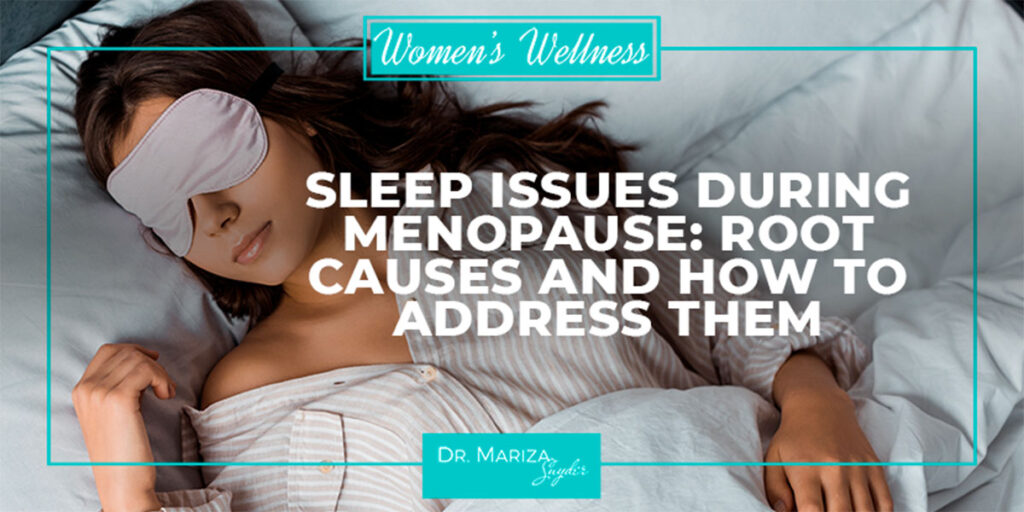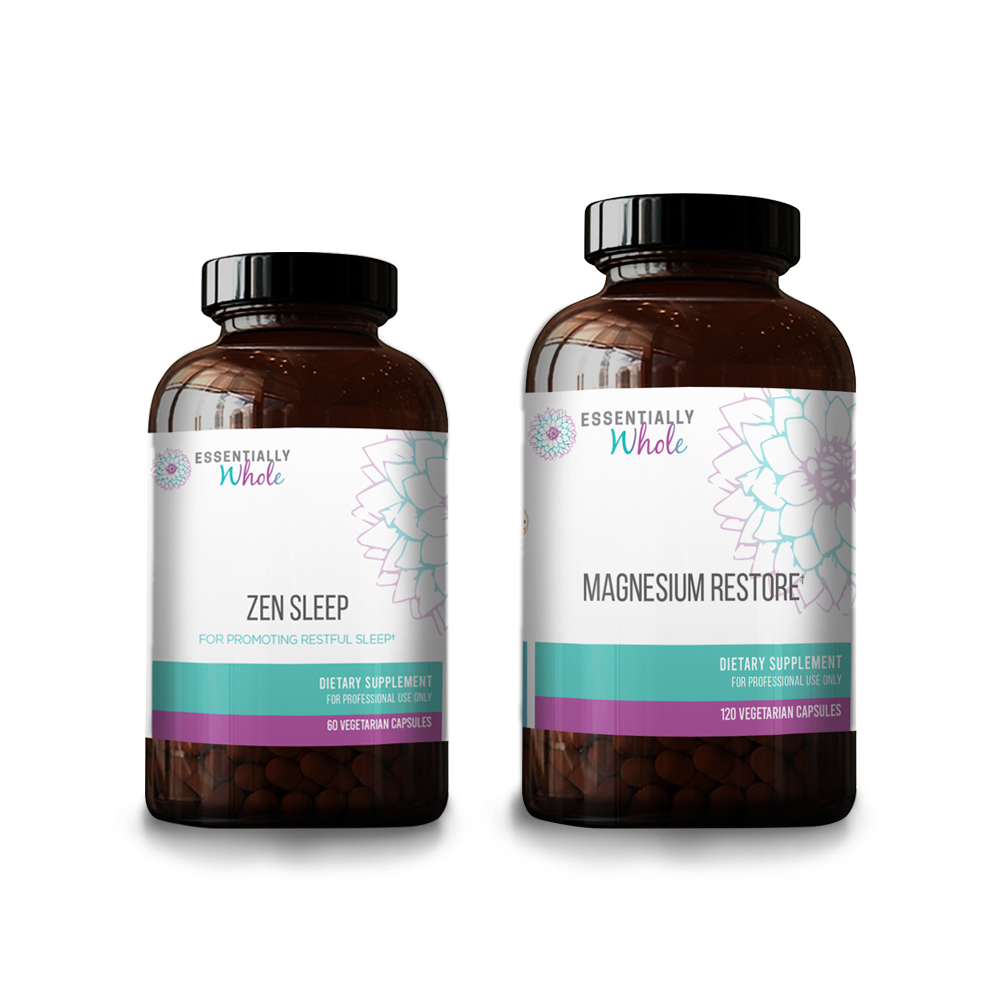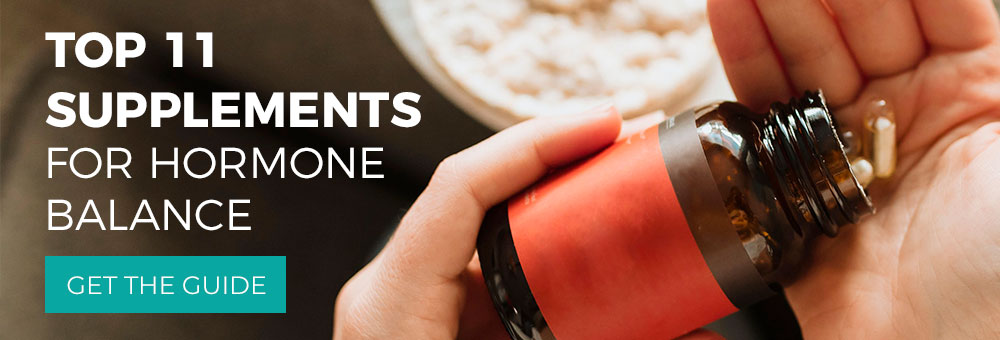
You’ve had a busy, crazy day, running from one commitment to the next, balancing work, family, friends, and yourself, and all you want is to get a good night’s sleep.
You settle in with a movie or good book, a glass of wine or mug of tea, and finally… time to wind down and get some rest.
But then the minutes tick by, and you’re still awake.
If you do drift off, you jolt awake minutes or hours later and the cycle restarts again.
Then the night sweats start… you wake up in a panic because you just can’t get cool fast enough.
What feels like it should be so simple—really, how hard should it be to sleep?!—suddenly becomes totally unreachable.
Then the next day you’re foggy, cranky, and needing some extra chocolate or coffee to get you through your day… and the cycle continues.
Sleep struggles can totally derail you. You feel frustrated at night, tired all day, and desperate for anything that will get you the few hours of peace and rest your body is crying out for.
And unfortunately, many women find that sleep issues get worse during perimenopause and menopause.
Maybe you’ve been warned by your mother or grandmother, or maybe you’ve seen the movies: women in menopause are “supposed” to be tired all the time, are “supposed” to wake with night sweats, or are “supposed” to wake multiple times through the night to pee, resettle, or for no reason at all…
Just like so many other culture-fueled lies about menopause, this one does NOT have to be true for you.
There are several reasons that sleep problems over 40 happen (and I’ll get into the biggest ones below), but before I do, I want you to know that…
You are NOT alone.
You are not going crazy.
There are changes happening in your body that are making sleep so elusive.
And most importantly: there are natural methods you can adopt to start sleeping better ASAP!
What Happens When You Don’t Sleep…
Maybe you thrived on all-nighters in your 20s. You pushed through and chugged coffee all day, and that worked for you then.
But the stakes are different now.
Your sleep needs change with age.
Just like what you used to eat in your 20s isn’t going to work anymore (no more dinners of peanut M&M’s and Diet Coke… at least not without paying the price later), your sleep habits need to adapt to the body you find yourself in today.
Women over 40 who are in perimenopause and menopause are in a period of constant stress—both in your life and within your own body. Changing hormone levels put a strain on your body, and you need all the rest you can get to make sure your body can still function at its best.
If you don’t get the amount of sleep your body needs, it could be a contributor to…
- Anxiety
- Depression
- Forgetfulness
- Clumsiness or falling
- Body aches
- Irritability and mood swings
- Low thyroid levels
- Increased risk of heart disease, obesity, and diabetes
- Excess belly fat
- Cravings, binge eating, and unhealthy food choices
- Reduced insulin sensitivity
- More severe PMS and heavier periods
While every woman’s individual sleep needs vary for the exact number of hours you should get, the important thing to know is that you need to listen to your body. If you feel off in any of these areas, addressing your sleep habits will be an important step in creating a vibrant, energized life in menopause and beyond.
Why Sleep Gets So Much Harder After 40
So if it’s so common for women to struggle with sleep after 40, what are the biggest reasons? Here are the top culprits that rob you of rest in perimenopause, menopause, and beyond:
#1 – Hot Flashes (also known as night sweats)
Night sweats are just hot flashes that happen at night. These are the #1 reason women identify sleep struggles because they are SO uncomfortable and SO disruptive. But it’s not actually the intense heat that’s waking you up…
Changes in your brain that signal hot flashes also signal your body to wake up. That means that your hot flash may not be what’s waking you up—your brain is… just in time to feel the onset of the heat.
Even though researchers still aren’t totally sure what causes hot flashes, we do have some promising evidence on ways to stop them (naturally and safely). Check out this post for my top 5 hot flash solutions that work!
#2 – Stress
This time of your life is perhaps the most stressful. Maybe you’re dealing with any combination of a struggling or excelling career, aging parents, young kids, teens, marriage, changing friendships, not to mention the crazy world we’re living in. And you’re left to adapt in whatever ways you can.
Your body’s sleep cycle relies on the primary stress hormone (cortisol) to follow a very predictable pattern. When you wake up, your cortisol increases to rev you up and get you ready for your day. As the evening wears on, your cortisol should steadily decrease so you’re able to calmly and peacefully drift off to sleep.
But when you’re constantly feeling stressed throughout your day and spending your evening hours watching the news or scrolling social media, these cortisol levels stay elevated, preventing you from being able to go to sleep.
#3 – Fluctuating Hormones
Yep, those again.
Your hormones are involved in way more than just reproduction. So when levels of hormones (especially progesterone) decrease thanks to perimenopause and menopause, it can cause your sleep to suffer as well.
First, progesterone is a primary calming hormone, reducing anxiety and symptoms of depression while promoting sleep. When progesterone levels are optimal, you are relaxed and sleep well, but, when your adrenal glands go into overdrive and pump out cortisol from excess stress, or your progesterone levels naturally fall due to perimenopause, your ability to rest and sleep goes out the window.
Second, estrogen fluctuations during perimenopause and menopause make you more susceptible to other symptoms-turned-stressors, such as hot flashes and night sweats, that can disrupt your sleep. Estrogen dominance (either caused by low progesterone or excess estrogen) also majorly disrupts your body’s natural ability to rest (learn more about estrogen dominance here).
Finally, melatonin is a neurotransmitter-like hormone that regulates your circadian rhythm (your body’s sleep-wake cycles). Melatonin levels naturally decrease during menopause as well, making rest even harder to get.
Melatonin and cortisol work as opposing forces in your body. When cortisol is high (usually, when you’re waking up in the morning), melatonin will decrease. When cortisol is low (usually, at night when you’re winding down), melatonin will increase. But if your cortisol levels are chronically elevated, your melatonin will never kick into gear enough to enable your body to settle down and signal cortisol to stop. Since your melatonin levels will naturally be lower than they used to be, you need to help them along as much as possible!
Other things that disrupt your melatonin levels would be staying up late with the lights on and using screens throughout the evening.
Sleep Solutions Designed for You
The internet is full of sleep suggestions, but how can you know what’s going to work for you? As with any health concern, “band-aid” solutions are not going to solve the problem long-term. You have to get back to the root cause to get the relief you’re desperate for.
Here are 6 solutions designed for women over 40 to help you get back to getting the sleep your body is crying out for (naturally, of course):
1. Meditation (calms your mind and body)
Meditating is the ultimate stress-reducing practice that will totally transform how you are able to wind down in the evenings. Concluding your day with simple meditation practice is an easy way to release any stress you’re holding onto from your day and signal to your body that it’s time to stop the cortisol and start to wind down.
Even doing 5-minute meditations throughout your day and in the evening can keep cortisol levels from building up too high and making sleep so hard to get!
Think meditation is hard or out of your reach? Check out Ziva Meditation and Muse Meditation Technology for easy, accessible ways to make meditation practice work in your life.
2. Increase Progesterone
Since low progesterone is a significant factor in disrupting sleep, increasing those levels is a root-cause approach to restoring your ability to rest. Check out this post for 3 simple tips to increase progesterone levels naturally!
3. Gentle Exercise (solves restless leg issues, lowers cortisol)
It’s well-recognized that exercising during the day will enhance your ability to sleep. But the kind of exercise you’re doing is key.
Intense, rigorous workouts increase cortisol levels. In some cases, this is a healthy thing for your body (that’s why we do it, after all).
But in perimenopause and menopause, the game changes. Intense workouts aren’t going to serve your body like they used to. In fact, they can make belly fat, sleep problems, and other symptoms worse instead of better.
Gentle exercise like walking, yoga, and resistance training lower cortisol levels and reduce restlessness to enable you to get to sleep (and stay asleep). Check out this podcast episode to learn more about how to leverage exercise for optimal hormone health.
4. Avoid Sugar and Alcohol
You’ve heard it before, and I’ll say it again… sugar is not your friend.
Fluctuating blood glucose levels and insulin changes cause more stress on your body and make it harder to settle down and can wake you prematurely throughout the night.
Heard that alcohol can help you sleep? Actually, evidence shows the opposite is true. While it may make you sleepy initially, even a small amount of alcohol makes it harder for your body to stay asleep for any length of time.
So if you’re feeling worn out and groggy by day and alert and on edge by night, dialing back on sugar and alcohol could be a simple switch to help you start sleeping better quickly.
5. Have Good Sleep Hygiene
This is getting down into the nitty-gritty of your routine, but research shows that there is a lot of power here. How you approach your evening hours, going to bed, and your bedroom environment can make or break your rest. Here are some things to think about…
- Spend the last hour or two of your day screen-free. No phones, no TV, no laptop. Not only will this remove potentially stressful situations, but it will prevent artificial light from throwing off your melatonin levels.
- Wind down with journaling, reading, or meditation. This is a great way to shut down racing thoughts and prepare your body for sleep. Pair these practices with a hot cup of herbal tea or calming essential oils for even more power!
- Have consistent evening rituals. Just like when you’re sleep training a baby, your body craves routine. Having a set pattern of practices and self-care in the evening will, over time, help signal your body that it’s time to sleep. Sticking to a consistent bedtime and routine leading up to sleep will make a huge difference.
- Turn out the lights! Melatonin production is triggered by being in the dark. If you tend to leave lights on or stay in brightly-lit rooms until right before you go to sleep, it may take a while for your melatonin levels to catch up, leaving you tossing and turning. Dimming lights throughout the evening is a simple way to trigger your body’s ability to rest.
- Use calming essential oils. Lavender, Roman Chamomile, Vetiver, Cedarwood, and Ylang Ylang are some of my favorites to diffuse at night because of their calming properties. Incorporating these into a relaxing bath, massage oil, or even applying them directly to your bed linens will help you unwind!
6. Supplement for Better Sleep
I know how it feels to be desperate for anything to help get the sleep you need. Insomnia literally runs your life if you’re dealing with it, so it’s natural to want to turn to a sleep aid to get some relief.
But before turning to prescription or over-the-counter drugs, I encourage you to explore supplements. Taking natural sleep-promoting supplements is the no-habit-forming, non-addictive way to naturally restore your body’s healthy sleep patterns.
There are two supplements I recommend taking 30 minutes before bed to help your brain wind down and keep you asleep all night long:
1. Magnesium Restore
Magnesium is an essential mineral to allow your muscles, brain, and body to relax. Most women are deficient, which is another possible cause of your sleep problems.
If you’ve tried magnesium supplements before and haven’t noticed a difference, I encourage you to try Magnesium Restore because I created it to be a trusted form to work WITH a woman’s body and hormones. Magnesium glycinate and magnesium oxide work synergistically to gently and steadily raise your magnesium levels while also delivering immediate benefits to your body. Get Magnesium Restore here >>
2. Zen Sleep
This is my own hand-selected formula of sleep-promoting botanicals and nutrients to calm your mind and body.
Zen Sleep contains…
- Melatonin and Chamomile (two of the most well-recognized natural sleep aids)
- Vitamin B-6 (essential for your brain to calm down and relax)
- 5-HTP (to balance melatonin and serotonin levels in your brain so you stay asleep all night)
- A blend of botanicals including Lemon Balm, Passion Flower, and Valerian (to lessen your stress and improve your sleep quality)
- And more natural, sleep-supportive ingredients
…all in one convenient package.
Zen Sleep is a safe and natural option to help you fall asleep sooner and sleep better so you can wake up rested and refreshed. Get Zen Sleep here >>
You can save 10% on these two products in my exclusive Sleep Bundle today! >>
Don’t Mess Around…
Sleep is NOT something you can live without.
Especially during perimenopause and menopause, your body relies on the time when you’re asleep to do some of the dirty work of detoxifying, balancing your hormones, repairing damage, and more.
You don’t have to live the lie that troubled sleep is just part of “getting older.” Your health and your energy are in your hands—and you have the power to create the life of your dreams (including getting restful sleep)!
FREE DOWNLOAD: Dr. Mariza’s Top 11 Supplements for Hormone Health
Ready to take charge of your own health?




No comments yet.